Sustainable culinary tours in Southern Europe promote local economies, preserve cultural heritage, and enhance environmental awareness. These tours include activities like farm visits, cooking classes, and wine tastings. Participants experience authentic local flavors while learning about sustainable practices. Challenges include limited options and varying quality standards, but careful planning can lead to rewarding culinary experiences.
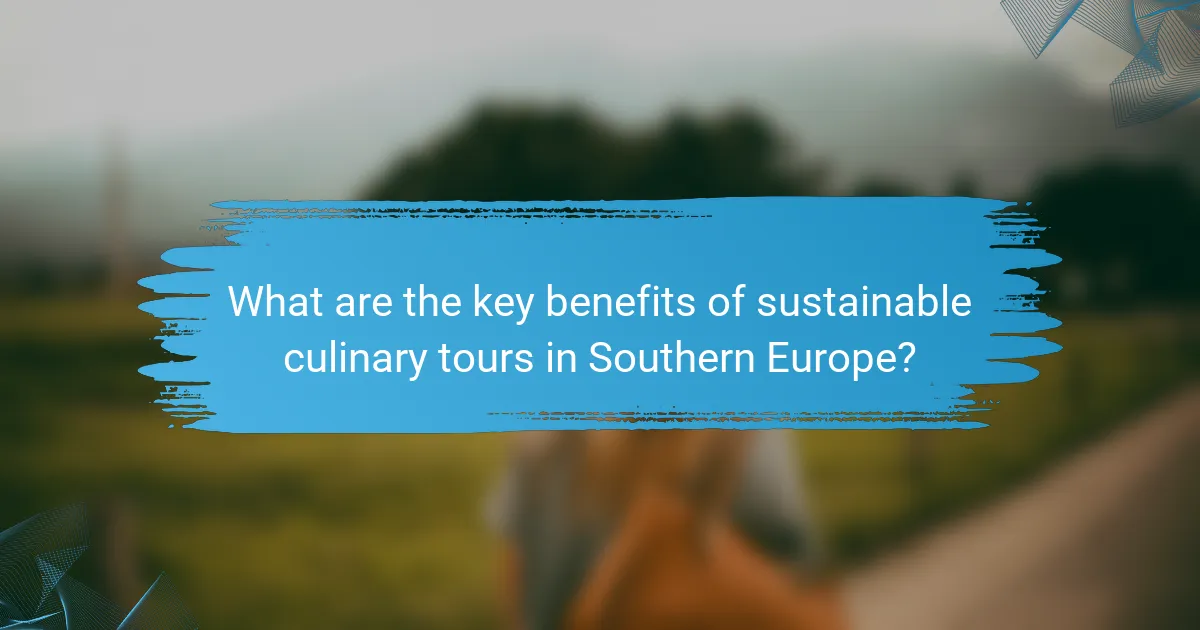
What are the key benefits of sustainable culinary tours in Southern Europe?
Sustainable culinary tours in Southern Europe offer key benefits such as promoting local economies, preserving cultural heritage, and enhancing environmental awareness. These tours connect travellers with local farmers, chefs, and artisans, fostering authentic experiences. Participants enjoy fresh, seasonal ingredients while learning about sustainable practices. Additionally, these tours often support eco-friendly initiatives, reducing carbon footprints and encouraging responsible tourism.
How do these tours support local economies?
Sustainable culinary tours significantly support local economies by promoting local businesses and creating jobs. These tours often feature local farms, markets, and restaurants, allowing visitors to experience regional flavours and traditions. As a result, increased tourism revenue directly benefits local producers and artisans. Furthermore, these tours foster community engagement, encouraging sustainable practices that enhance the area’s cultural heritage. By prioritising local sourcing, culinary tours help maintain traditional agricultural methods, contributing to the preservation of local ecosystems and economies.
What environmental advantages do sustainable culinary tours offer?
Sustainable culinary tours offer significant environmental advantages by promoting local agriculture and reducing carbon footprints. These tours often emphasise seasonal and organic ingredients, which support biodiversity and minimise chemical usage. Additionally, they encourage responsible tourism practices, fostering conservation efforts in local communities. By connecting travellers with local producers, these tours help preserve traditional farming methods and promote sustainable land use.
How do culinary tours enhance cultural experiences?
Culinary tours enhance cultural experiences by immersing participants in local traditions and flavours. These tours promote sustainability by supporting local farmers and artisans, fostering community connections. Engaging in hands-on cooking classes allows travellers to learn traditional recipes, deepening their appreciation for regional cuisine. Additionally, tasting local dishes in authentic settings creates memorable interactions with local cultures.
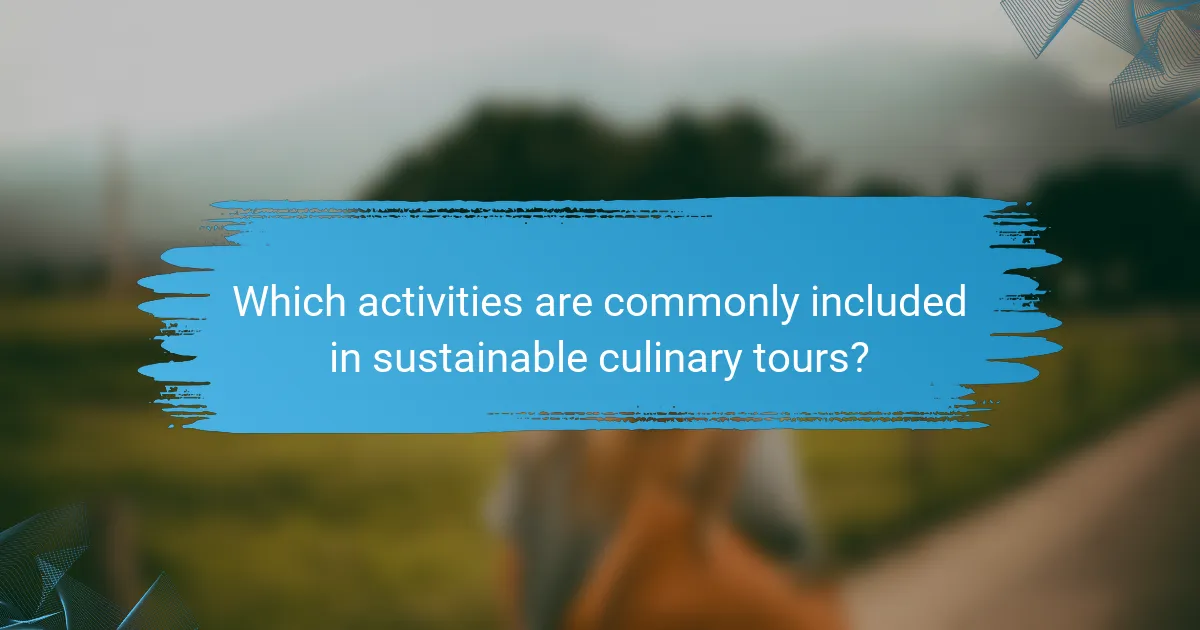
Which activities are commonly included in sustainable culinary tours?
Sustainable culinary tours typically include activities such as farm visits, cooking classes, wine tastings, and local market explorations. These experiences emphasise organic ingredients and traditional cooking methods, enhancing appreciation for local flavours. Participants often engage with local producers, fostering a connection to the region’s culinary heritage.
What types of cooking classes can participants expect?
Participants can expect a variety of cooking classes focused on local ingredients and sustainable practices. Classes may include hands-on workshops, farm-to-table experiences, and traditional cooking techniques. Participants will learn to prepare regional dishes while exploring the culinary heritage of Southern Europe. Unique attributes of these classes often involve collaboration with local chefs and farmers, enhancing the overall experience.
How do guided tastings of local produce work?
Guided tastings of local produce involve organised experiences where participants sample regional foods, often led by knowledgeable hosts. These tours highlight the unique flavours, preparation methods, and cultural significance of local ingredients. Participants gain insights into sustainable practices and the benefits of supporting local farmers. Engaging with local producers enhances the culinary experience and fosters appreciation for regional biodiversity.
What role do farm visits play in the experience?
Farm visits significantly enhance sustainable culinary tours by providing firsthand experiences with local agriculture. Participants engage directly with farmers, fostering a deeper understanding of food sourcing and sustainable practices. These visits often include tastings of fresh produce, highlighting the unique flavours of the region. Additionally, they promote community connections, supporting local economies and encouraging sustainable farming methods. Overall, farm visits are integral to the immersive experience of sustainable culinary tours in Southern Europe.
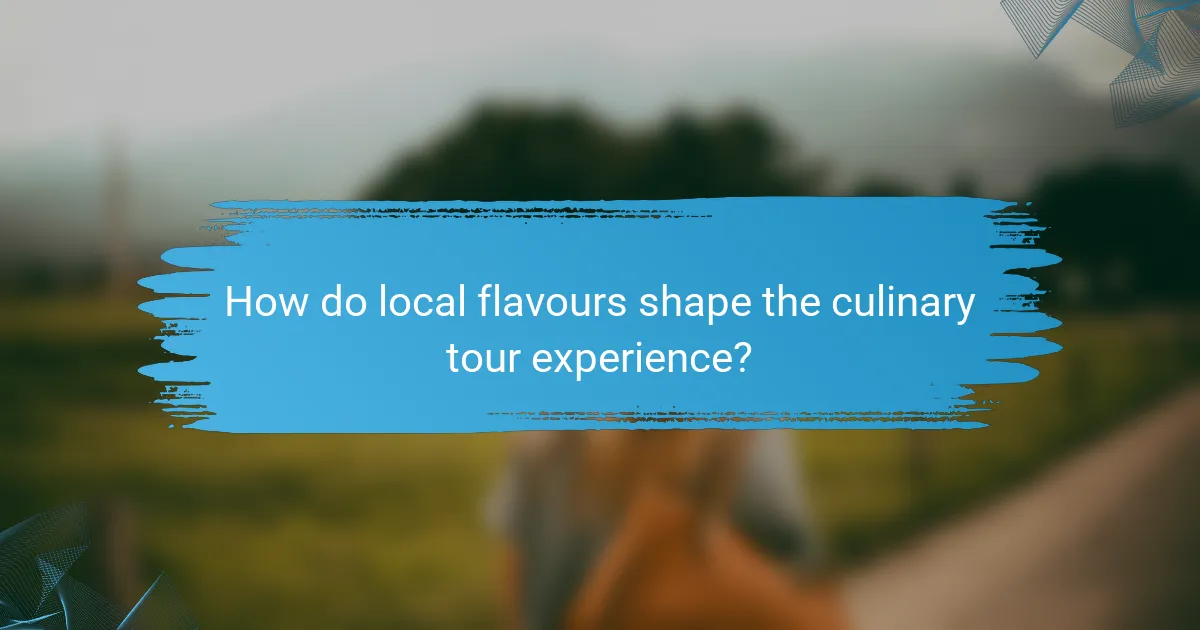
How do local flavours shape the culinary tour experience?
Local flavours significantly enhance the culinary tour experience by providing authentic tastes and cultural insights. These unique ingredients and traditional recipes create memorable meals that reflect regional heritage. Tourists engage with local chefs, learning about sourcing and preparation methods, which deepens their appreciation for the cuisine. This interaction fosters sustainability by supporting local economies and promoting environmentally friendly practices. Culinary tours often highlight seasonal produce, ensuring freshness and quality while encouraging visitors to explore diverse food landscapes.
What are the signature dishes unique to this region?
Signature dishes unique to Southern Europe include paella, moussaka, and risotto. These dishes highlight local ingredients and culinary traditions.
Paella, originating from Spain, features rice, saffron, and seafood or meat, reflecting coastal flavours. Moussaka, a Greek favourite, layers eggplant, ground meat, and béchamel sauce, showcasing Mediterranean vegetables. Risotto, an Italian staple, is creamy rice cooked slowly with broth, often flavoured with mushrooms or seafood.
Each dish emphasises sustainability by utilising regional produce and traditional cooking methods, enhancing both flavour and environmental responsibility.
Which local ingredients are highlighted during tours?
Sustainable culinary tours in Southern Europe often highlight local ingredients such as olives, tomatoes, and cheeses. These ingredients showcase regional flavours and promote sustainable farming practices. Tours may also feature seasonal fruits and herbs, emphasising freshness and local sourcing. Unique attributes include artisanal production methods and traditional recipes, enhancing the culinary experience.
How is traditional cooking preserved through these tours?
Traditional cooking is preserved through sustainable culinary tours by connecting travellers with local chefs and communities. These tours emphasise the importance of regional ingredients, cooking techniques, and cultural heritage. Participants engage in hands-on activities, such as cooking classes and market visits, which foster appreciation for traditional recipes. Additionally, storytelling by local guides reinforces the significance of these culinary practices in preserving local identities. This immersive experience ensures the continuity of traditional cooking methods while promoting sustainable tourism.
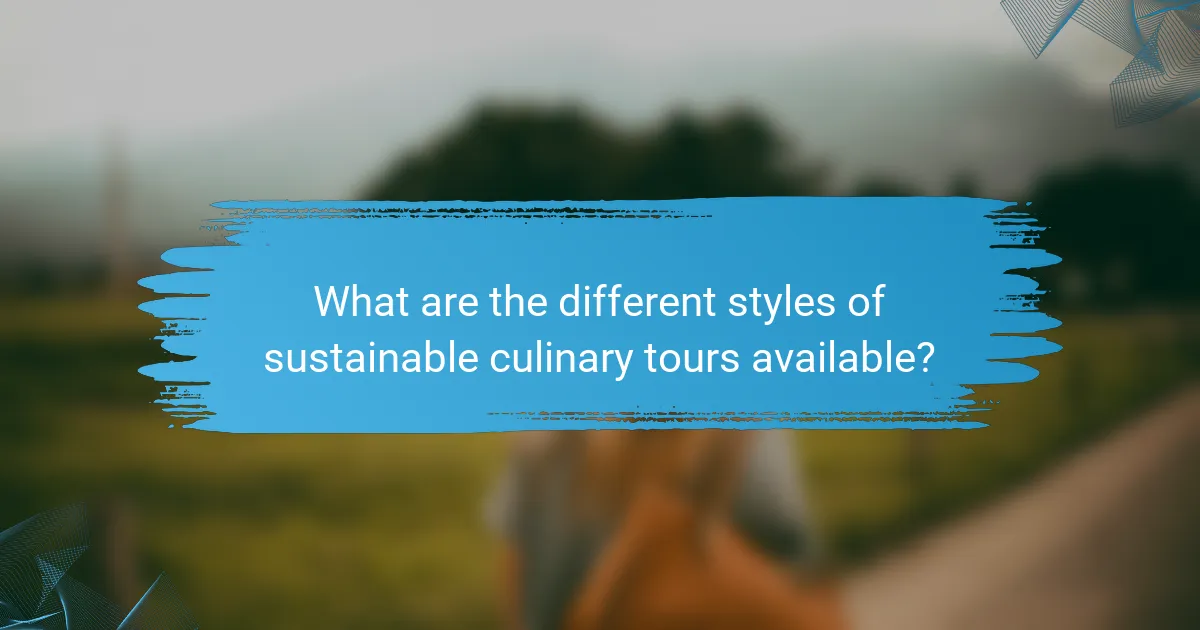
What are the different styles of sustainable culinary tours available?
Sustainable culinary tours in Southern Europe vary in style, focusing on local cuisine, eco-friendly practices, and cultural immersion. Common styles include farm-to-table experiences, cooking classes with local chefs, wine and olive oil tastings, and guided market tours. These tours often emphasise seasonal ingredients and traditional cooking methods, providing participants with authentic flavours and culinary skills. They foster a deeper connection to the region’s food culture while promoting sustainability and supporting local communities.
How do immersive experiences differ from casual tours?
Immersive experiences engage participants deeply, while casual tours offer a more relaxed exploration. Sustainable culinary tours in Southern Europe exemplify immersive experiences through hands-on activities like cooking classes and local market visits. These tours promote cultural connection and environmental awareness, enhancing the overall experience. Casual tours typically involve passive observation, lacking the interactive elements that make immersive experiences memorable.
What are the advantages of small group tours versus larger ones?
Small group tours offer personalised experiences, deeper connections with local cultures, and greater flexibility compared to larger tours. These advantages enhance sustainable culinary tours in Southern Europe by allowing participants to engage with local flavours and traditions more intimately.
Smaller groups foster interaction with local chefs and artisans, leading to unique culinary experiences. Participants can enjoy exclusive tastings and cooking classes that larger groups cannot accommodate. Additionally, small group dynamics encourage collaboration and shared experiences, enriching the overall journey.
Flexibility in itineraries is another significant benefit. Small groups can easily adapt plans based on participant interests, weather, or local events. This adaptability ensures a more immersive and satisfying culinary adventure.
In contrast, larger tours often follow rigid schedules and generic experiences, limiting authentic engagement with the local culinary landscape. Thus, small group tours present a compelling choice for those seeking a meaningful and sustainable travel experience focused on culinary delights.
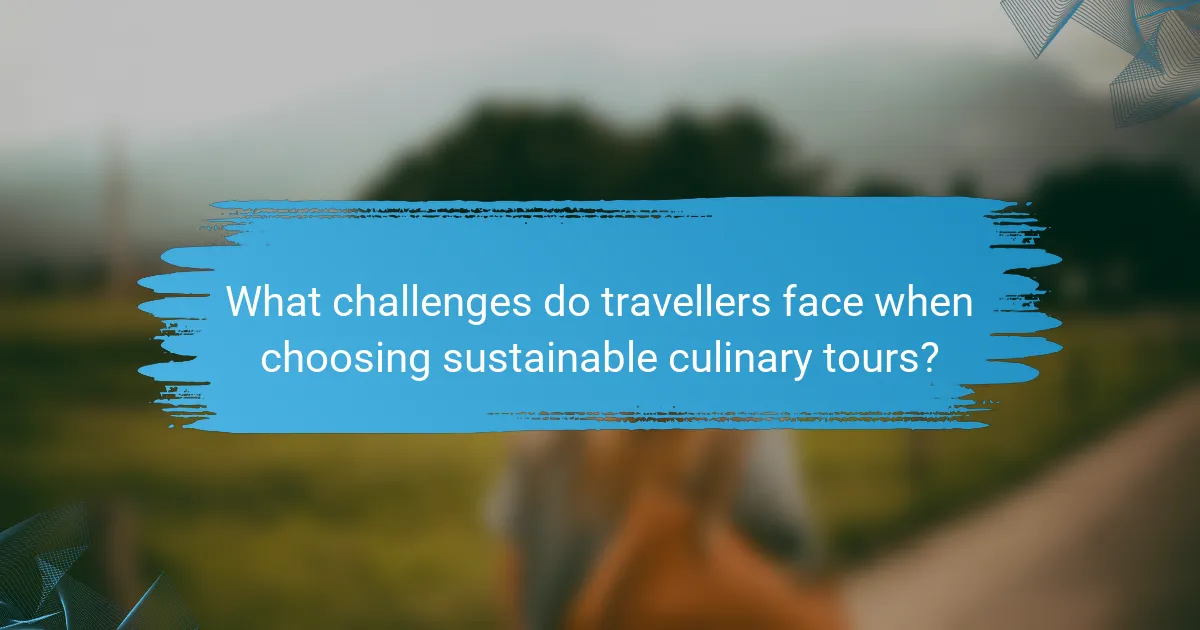
What challenges do travellers face when choosing sustainable culinary tours?
Travellers face several challenges when choosing sustainable culinary tours, including limited availability of options, higher costs, and varying quality standards. Many tour operators may not transparently communicate their sustainability practices, making it hard for travellers to make informed choices. Additionally, travellers may struggle to find tours that genuinely support local communities and environmental initiatives. Understanding these challenges is essential for selecting a culinary experience that aligns with sustainable values.
How can dietary restrictions be accommodated?
Dietary restrictions can be accommodated through tailored menus and local ingredient sourcing. Sustainable culinary tours in Southern Europe often prioritise inclusivity by offering vegetarian, vegan, gluten-free, and allergen-free options. Chefs collaborate with local farmers to ensure fresh, suitable ingredients that meet diverse dietary needs. This approach enhances the culinary experience while respecting individual preferences and restrictions.
What are common misconceptions about sustainable tourism?
Common misconceptions about sustainable tourism include the belief that it is only about eco-friendly practices. Many think it lacks authenticity, assuming local experiences are diminished. Others believe sustainable tourism is more expensive, overlooking budget-friendly options. Some assume it only benefits tourists, ignoring its positive impact on local communities. Finally, many think sustainable tourism limits choices, while it actually encourages diverse, unique experiences.
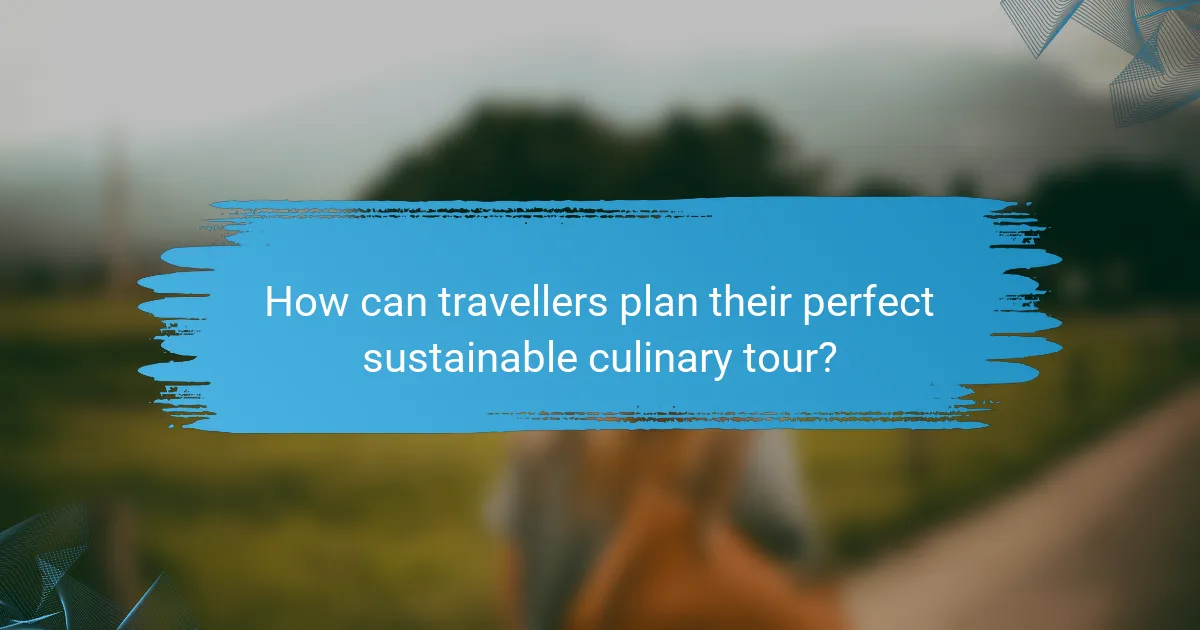
How can travellers plan their perfect sustainable culinary tour?
Travellers can plan their perfect sustainable culinary tour by focusing on local ingredients, traditional cooking methods, and eco-friendly practices. Begin by researching regions in Southern Europe known for their culinary heritage, such as Italy or Spain. Prioritise farms and restaurants that emphasise organic, seasonal produce. Participate in cooking classes that highlight local recipes and use sustainable techniques. Engage with local communities to learn about their food culture and support small-scale producers. Finally, consider accommodations that practice sustainability, ensuring a holistic approach to your culinary experience.
What factors should be considered when selecting a tour operator?
When selecting a tour operator for sustainable culinary tours in Southern Europe, consider their commitment to local sourcing, environmental practices, and cultural authenticity. Evaluate their partnerships with local farmers and chefs to ensure genuine experiences. Look for operators that prioritise small group sizes, enhancing personal engagement with local communities. Additionally, assess customer reviews for insights into the quality of food experiences and overall satisfaction. Finally, confirm their adherence to sustainable tourism certifications, which reflect their dedication to responsible travel practices.
What are the best times of year to experience culinary tours?
The best times of year to experience sustainable culinary tours in Southern Europe are spring and autumn. Spring offers vibrant seasonal produce and blooming landscapes, while autumn showcases harvest festivals and rich flavours. These seasons enhance the culinary experience through fresh ingredients and local traditions.
What tips can enhance the overall tour experience?
To enhance the overall tour experience, consider these practical tips. Engage with local chefs to gain insights into traditional cooking methods. Participate in hands-on cooking classes to deepen your culinary skills. Explore local markets for fresh ingredients, enhancing your understanding of regional flavours. Prioritise sustainable practices by choosing eco-friendly tours that support local communities. Lastly, maintain an open mind to new tastes and culinary traditions, enriching your overall journey.